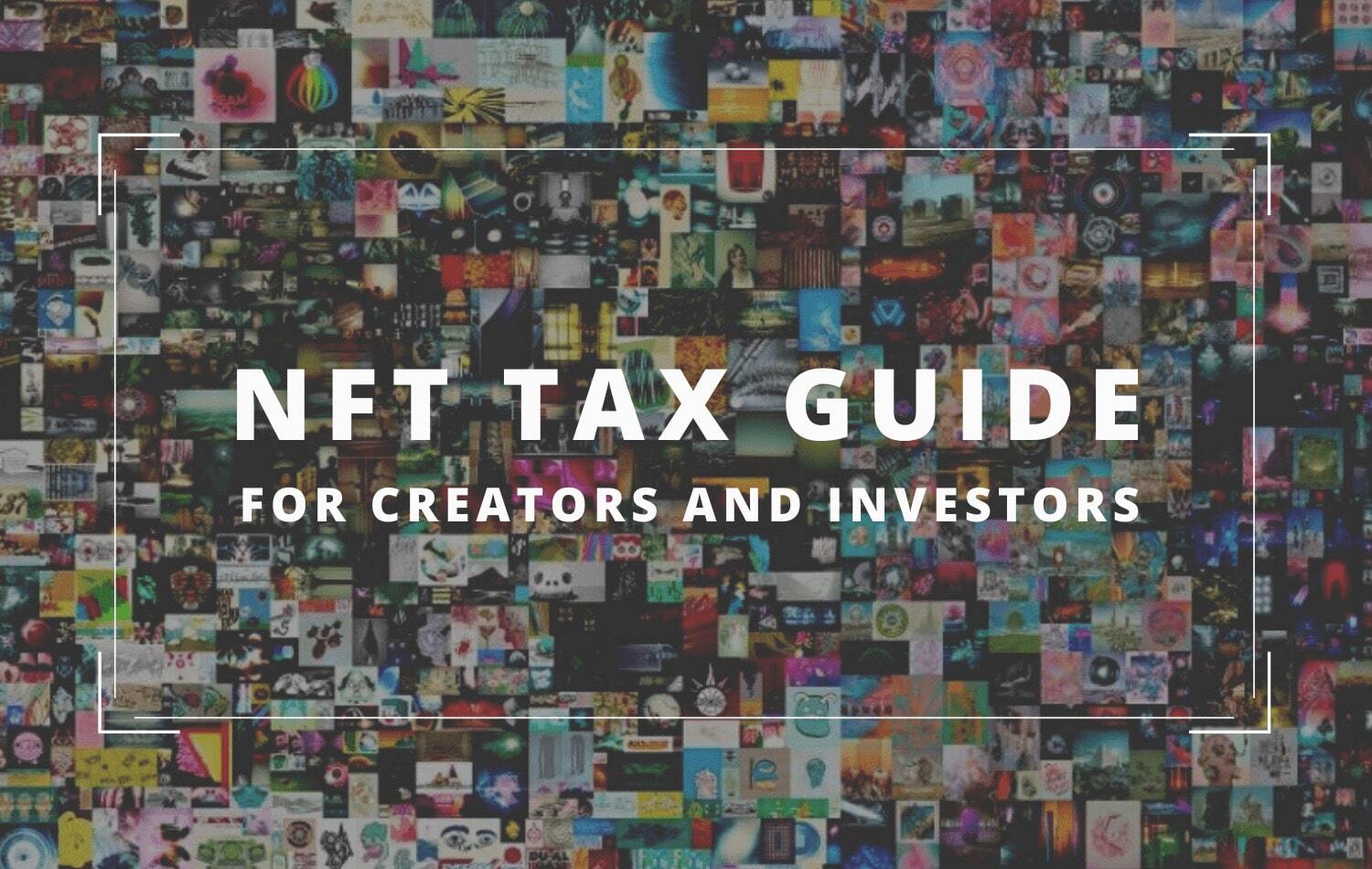In most cases, NFTs are subject to the same tax laws as fungible cryptocurrencies.
Whether you’re an artist creating and selling non-fungible tokens (NFTs) or an investor buying and selling NFTs for profit, understanding how NFTs are taxed can help you avoid a surprise tax bill at the end of the year.
In this article, we’ll answer the following questions:
- What is an NFT?
- Why have NFTs become so popular?
- Do I have to pay taxes on NFTs?
- How are NFT projects taxed?
- Is creating an NFT a taxable event?
- How are NFTs taxed for sellers?
- How are NFTs taxed for buyers?
- How are NFTs taxed if I trade one NFT for another NFT?
- Can I use FIFO or Specific Identification accounting methods for my NFT gains and losses?
What is an NFT?
An NFT is a digital identifier created through a smart contract running on a decentralized network, typically Ethereum.
Unlike fungible cryptocurrencies such as bitcoin (BTC) or cronos (CRO), NFTs are one-of-a-kind tokens that can’t be duplicated and have inherent value derived from their uniqueness. For example, you could swap one BTC for another BTC the same way you could swap a dollar for another dollar; but since each NFT is unique, they aren’t interchangeable, the same way you can’t substitute a Picasso painting for a Renoir.
Why have NFTs become so popular?
One of the reasons NFTs are becoming so popular for both creators and investors is because they are adaptable in both function and form. NFT producers have created collectables from Bored Apes and CryptoPunks to generative art algorithms and NBA basketball moments.
When artists, musicians, or anyone creating one-of-a-kind content converts their digital masterpieces into NFTs, they ensure their work’s authenticity, create scarcity, and can actively manage ownership of the project.
Collectors and speculators are beginning to recognize the potential advantages of buying and selling NFTs: guaranteed authenticity, no physical degradation of the product, and relatively quick and frictionless transactions.
Amid the excitement surrounding the burgeoning economy of NFTs, there is one factor that many creators, buyers and sellers neglect to take into account—taxes.
Whether you’re an artist creating and selling NFTs or an investor buying and trading NFTs, it’s important to understand how NFTs are taxed.
Do I have to pay taxes on NFTs?
Yes. In most cases, NFTs are subject to the same tax laws as fungible cryptocurrencies.
The most common taxable NFT activities include:
- Selling an NFT
- Purchasing an NFT with crypto
- Trading an NFT for another NFT
How are NFT projects taxed?
The IRS has categorized fungible cryptocurrencies as property. Although NFTs aren’t fungible, they still should qualify as personal property under the tax code.
NFTs are taxed differently depending on whether you are a creator, a buyer or a seller.
It’s important to note, the IRS hasn’t formally announced how it will tax NFTs in certain situations, nor do most NFT platforms offer specific tax guidance for purchases and sales. It is even more important to note that the lack of formal IRS and platform guidance doesn’t mean you can ignore paying taxes on NFTs. The responsibility falls on you to keep a record of all of your NFT transactions and report them on your tax return.
Is creating an NFT a taxable event?
No. Creating an NFT isn’t a taxable event. However, selling the NFT on a marketplace like OpenSea or Rarible is.
How are NFTs taxed for sellers?
When you sell an NFT that you created, you need to report the sale as income and pay taxes on the profits.
Unlike crypto held as a capital asset, NFTs you created are treated as stock in trade. Profits received on the sale of NFTs you created are considered income and will be taxed at your ordinary income tax rate, which varies from 10%-37% depending on your tax bracket. You need to report your taxes this way, whether you are paid in dollars, ether, bitcoin or any other cryptocurrency.
Additionally, this income may be subject to self-employment taxes if your NFT creation activity rises to the level of a trade or business. You should consult with a tax professional, but if your creation activity extends beyond a simple one-off situation, it’s likely the IRS may classify it as a trade or business.
What is the IRS’s position on taxing NFT sales?
The IRS hasn’t officially stated how the gain or loss from the resale of an NFT by a collector should be taxed, but an NFT is almost certainly considered property.
In the hands of a collector, the NFT would be treated as a capital asset. As a capital asset, though, it isn’t clear whether a particular NFT would be taxed at typical capital gain rates or would be classified as a collectible and taxed at a 28% tax rate.
Are NFTs collectibles?
The tax code identifies certain capital assets as collectibles:
- Any work of art
- Any rug or antique
- Any metal or gem
- Any stamp or coin
- Any alcoholic beverage
- Or any other tangible personal property specified by the IRS as a collectible
An NFT may possibly fit into the work of art category. However, the catchall provision specifically refers to tangible property. NFTs, unless they relate to a physical work, are intangible.
Currently the IRS hasn’t identified any additional tangible property as a collectible, but the requirement that such property be tangible rather than intangible raises a question as to whether the other items on the list, including works of art, also need to be tangible. Ultimately, there’s no clear guidance. The tax code, however, does indicate that NFTs that don’t fit into any of the above categories aren’t likely to be collectibles.
How are NFTs taxed for buyers?
Buying an NFT is only a taxable event if you use cryptocurrency to make the purchase.
When you purchase an NFT using crypto, the IRS recognizes this transaction as a disposal of the cryptocurrency. You’ll incur a capital gain or loss and be taxed accordingly. The value of the crypto you use to purchase the NFT is going to establish your cost basis in that transaction.
For instance, if you bought an NFT trading card on OpenSea with ETH that has appreciated in value, you’ll incur a capital gain on the ETH used to acquire the NFT and need to pay taxes on the amount of the gain.
If you held the appreciated ETH you used to buy the NFT for over a year, you’d be subject to a long-term capital gains tax rate. If you held the ETH for less than a year, you’d be subject to a short-term capital gains tax rate. To learn more about the crypto tax rate, please read our article.
If you bought the NFT trading card with depreciated ETH, you’d incur a capital loss. You can use your capital loss to offset other capital gains which will lower your total tax liability.
How are NFTs taxed if I trade one NFT for another NFT?
As noted earlier, trading an NFT for another NFT is not a one-to-one proposition. A trade triggers either a capital gain or a capital loss.
For instance, If you bought an NFT for ether (ETH) worth $2,000 and traded it for another NFT a few months later that was worth $3,500 of ETH, you’ll incur a taxable capital gain of $1,500.
Similarly, if you traded your NFT worth $3,500 of ETH for a NFT worth $1,000 of ETH, you’ll incur a $2,500 capital loss that you can report to offset your total taxable capital gains.
Can I use FIFO or Specific Identification accounting methods for my NFT gains and losses?
Probably not. Because NFTs are all unique, they don’t fit into the definition of virtual currency established by the IRS.
As noted above, the IRS has yet to provide any formal guidance on NFTs, but they’re likely considered property and would be subject to the typical rules for calculating gains and losses on specifically-identifiable property.
Under those rules, you’re required to track the purchase price of the specific property and use that purchase price as the cost basis when calculating the gain or loss on that same specific property. The accounting rules identified in the IRS’s virtual currency FAQs such as First In, First Out (FIFO) and Specific Identification wouldn’t apply.
To learn more about cost-basis assignment method—FIFO and Specific Identification—please read our Crypto Tax Guide.
About Taxbit
Keeping up with all the paperwork and reporting regulations for digital asset transactions can be laborious and time-consuming. The more complex your crypto portfolio becomes, the more complicated your tax liabilities can get.
Taxbit helps track your crypto transactions and fills out your tax forms automatically.
We also recognize the need to support your DeFi activity, and each day we’re actively working on expanding DeFi support to popular blockchains.
The initial version of our DeFi support allows you to sync in any transfers, trades, and approvals you’ve made on a DeFi platform involving ERC-20 tokens on the Ethereum network, or BEP-20 tokens on the Binance Smart Chain network.
With our Plus+ and Pro plans, you’ll have access to full NFT and DeFi Centers where you can see your actual NFTs, DeFi positions, and a corresponding performance analysis.
Ready to try out the updates for yourself? Create an account or login to start.
.png)


